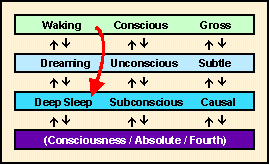Yoga Nidra:
Yogic Conscious Deep Sleep
Yogic Conscious Deep Sleep
Yoga Nidra brings an incredible calmness, quietness and clarity. Yoga Nidra is one of the deepest of all meditations, leading awareness through many levels of mental process to a state of supreme stillness and insight. The descriptions in the article below can be difficult to understand. With patient and thorough reading, the understanding is well worth the effort, allowing you to see the profound depth of Yoga Nidra, which is far beyond just relaxation. It is said that a picture is worth a thousand words. Sometimes it takes thousands of words to get the inner "aha" of the meaning. Most important of all, it is the persistent practice that brings the real joy of the practice of Yoga Nidra, as with all useful practices in life and Yoga.
Yoga Nidra means Yogic Sleep. It is a state of conscious Deep Sleep. In Meditation, you remain in the Waking state of consciousness, and gently focus the mind, while allowing thought patterns, emotions, sensations, and images to arise and go on. However, in Yoga Nidra, you leave the Waking state, go past the Dreaming state, and go to Deep Sleep, yet remain awake. While Yoga Nidra is a state that is very relaxing, it is also used by Yogis to purify the Samskaras, the deep impressions that are the driving force behind Karma.

Yoga Nidra has been known for thousands of years by the sages and yogis. Of the three states of consciousness of Waking, Dreaming and Deep Sleep, as expounded in the Upanishads, particularly the Mandukya Upanishad, Yoga Nidra refers to the conscious awareness of the Deep Sleep state, referred to as prajna in Mandukya Upanishad. This is the third of the four levels of consciousness of AUM mantra, relating to the state represented by the M of AUM. The four states are Waking, Dreaming, sleep, and turiya, the fourth state. The state of Yoga Nidra, conscious Deep Sleep, is beyond or subtler than the imagery and mental process of the Waking and Dreaming states. As a state of conscious Deep Sleep, Yoga Nidra is a universal principle, and is not the exclusive domain of any more recent teachers or traditions.
No comments:
Post a Comment